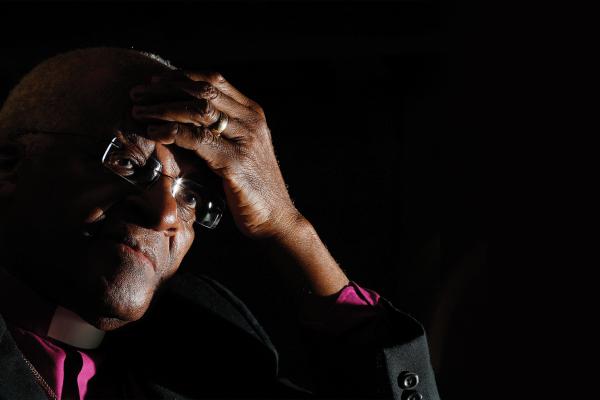I FIRST HEARD Archbishop Desmond Tutu speak at the National Cathedral in Washington, D.C., sometime around 1987. It was at the height of apartheid in South Africa, and the world was just waking up to its horrors and organizing global economic sanctions.
Tutu spoke of an elderly woman he had met a few days earlier in Soweto. She told him that every night she got up at 2 a.m. for an hour in order to beg God solemnly for an end to apartheid. “I know we will win now,” Tutu told us, “because God cannot resist the prayer of that poor old woman.” With that, he burst into tears. Those tears of peace converted the thousands of us who crowded in to hear him. We had never heard such a witness for peace.
Later, I came to know him as a friend. During my 2014 pilgrimage to South Africa, I spent a morning visiting the great man at his foundation headquarters in Cape Town. First, we had Mass together with his staff; then he catered a brunch for me and my friends. He and I helped ourselves to a plate of food and coffee, then sat together by ourselves for an hour.
“We do not have the right to give up this work,” he told me. “Our sisters and brothers are suffering around the world, so we have to keep working for peace and justice till the day we die.” I was amazed to hear that he planned to leave the next day for Iran. He was in his 80s, in bad health, and relentless.
He spoke of the millions of squatters living in total poverty around Cape Town and elsewhere. “We have the ultimate First World wealth and the worst Third World poverty, the biggest gap between rich and poor in the world,” he said. “One percent of the money for war and nuclear weapons could feed and house these poor people. Sometimes I say to God, ‘What the heck is going on? Why don’t you do something?’”
When I told him about the work for peace my friends and I were organizing in the U.S., he continued talking about God. “I’m so glad I’m not God,” he said. “Think of the patience of God, waiting for us to get it, waiting for us to finally do the things you are doing! So few people see that we’re all sisters and brothers!”
“Imagine what God went through during the Holocaust,” he continued, “waiting while some of his children killed his other children and there was nothing he could do. God is omnipotent and omnipresent but he has decided to give us the gift of freedom, to let us choose to accept the goodness and love or not, and because God gave us this gift of freedom, God cannot intervene. So this omnipotent God is completely weak and powerless before the evil we do. This is the God we have. God is very weak. I am so glad I am not God and that God is God.”
“How do you keep going?” I asked.
“My favorite prophet is Jeremiah,” he answered. “Do you know why? Because he cries a lot!” Then he leaned close to me and whispered, “I cry a lot too. I cry a lot. I cry every day. But think how much God cries! We have a God who weeps. God weeps because we don’t get it. We don’t understand that we are all sisters and brothers. So I cry a lot and always have. But I also laugh a lot too.” With that he let out an uproarious laugh.
TOWARD THE END of our visit, I presented him with a large photo book of pictures of Martin Luther King Jr. and a handmade blue-and-white blanket from New Mexico, which he promptly threw over his shoulders. “You need to come more often!” he said with a big laugh. As he walked me to the door, he put his arm around me and said, “Never give up, John. Never give up!”
“There is a moral universe,” he once said, “which means that despite all the evidence that seems to be to the contrary, there is no way that evil and injustice and oppression and lies can have the last word. ... That is what has upheld the morale of our people, to know that in the end, good will prevail.” He learned that lesson from the South African people and shared it with the world. Evil will not triumph; good will prevail.
“In a situation where human life seems dirt cheap, with people being killed as easily as one swats a fly, we must proclaim that people matter and matter enormously,” he once said. “To be neutral in a situation of injustice is to have chosen sides already. It is to support the status quo.”
ARCHBISHOP TUTU models the peacemaking life for our times. He shows Christians what a peacemaker looks like, and he encourages us through his own witness to pursue our own peacemaking vocations.
As we consciously seek to become peacemakers and meditate on God as a peacemaker, we begin to understand our true selves as sons and daughters of the God of peace. This is the root of peacemaking, the spirituality of nonviolence—that God is a God of peace, and that God’s sons and daughters are peacemakers too. This is who we are; this is our true identity. We live in relationship with the God of peace as God’s beloved sons and daughters, so we go forth into the world of war to make peace.
The culture of war always tries to name us, and we let them tell us who they think we are—you are Americans, you are liberals or conservatives, you are rich or poor, you are nobodies. But Jesus comes along and announces that every one of us is the son or daughter of the God of peace. With the announcement of our true identities, we willingly go into the culture of war as God’s peacemakers, advocates of God’s reign of peace.
Nonviolence, peacemaking, and the understanding of our true identities as God’s sons and daughters lead us to an ever-deeper realization that every human being is our sister and brother, a beloved child of God. Inspired anew each day, we love everyone with a universal, nonviolent love. This process leads us deeper and deeper into new insights about who we are, who God is, what life is about, and where we are headed.

Got something to say about what you're reading? We value your feedback!
